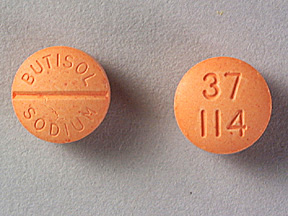Butabarbital Dosage
Applies to the following strengths: 30 mg/5 mL; 15 mg; 30 mg; 50 mg; 100 mg
Usual Adult Dose for:
Usual Pediatric Dose for:
Additional dosage information:
Usual Adult Dose for Sedation
Daytime sedation: 15 to 30 mg orally 3 to 4 times a day
- Duration of therapy: Up to 2 weeks
Preoperative sedation: 50 to 100 mg orally ONCE, given 60 to 90 minutes prior to surgery
Comments:
- When treating used as a daytime sedative, this drug typically loses effectiveness for sleep induction and maintenance after 2 weeks.
- Intermediate-acting barbiturates may be more effective in maintaining sleep; however, controlled studies have failed to demonstrate the effects.
- Treatment should be limited to short-term use.
Uses:
- As a daytime sedative
- For preoperative sedation
Usual Adult Dose for Insomnia
Hypnotic: 50 to 100 mg orally once a day at bedtime
Duration of therapy: Up to 2 weeks
Comments:
- When treating insomnia, this drug typically loses effectiveness for sleep induction and maintenance after 2 weeks.
- Intermediate-acting barbiturates may be more effective in maintaining sleep; however, controlled studies have failed to demonstrate the effects.
- Treatment should be limited to short-term use.
Use: As a bedtime hypnotic for the short-term treatment of insomnia
Usual Pediatric Dose for Sedation
Children: 2 to 6 mg/kg orally ONCE, given 60 to 90 minutes prior to surgery
- Maximum dose: 100 mg
Use: As a preoperative sedative
Renal Dose Adjustments
Data not available
Liver Dose Adjustments
Patients with liver damage: Use with caution; initial doses should be reduced.
Patients with premonitory signs of hepatic coma: Not recommended.
Dose Adjustments
Patients who are elderly and/or debilitated: The dose should be reduced because these patients may be more sensitive to barbiturates.
Withdrawal regimens: Cautious and gradual withdrawal of this drug should be performed over an extended period. The manufacturer product information should be consulted regarding recommendations for specific dosing regimens.
Precautions
CONTRAINDICATIONS:
- Hypersensitivity to the active component, known sensitivity to barbiturates, or to any of the ingredients
- Patients with a history of latent or manifest porphyria
Consult WARNINGS section for additional precautions.
US Controlled Substance: Schedule III
Dialysis
Data not available
Other Comments
Storage requirements:
- Store at 20 to 25C.
General:
- The lowest effective dose should be used for shortest amount of time possible.
Monitoring:
- HEMATOLOGIC: Periodic blood counts, especially in patients on long-term treatment
- HEPATIC: Periodic liver function tests, especially in patients on long-term treatment
- RENAL: Periodic renal function tests (e.g., respiration rate), especially in patients on long-term treatment
Patient advice:
- Patients should be instructed to immediately report "sleep driving," other complex behaviors, and any new/worsening signs/symptoms of depression.
- Inform patients that this drug may cause blurred vision, dizziness, impaired coordination, prolonged reaction time, short-term memory impairment, and/or somnolence, and they should avoid driving or operating machinery if these side effects occur.
- Patients should avoid drinking alcohol or taking other drugs that may cause sleepiness or dizziness while taking this drug until they talk to their healthcare provider.
- Patients should be told to contact their healthcare provider before changing the dose or discontinuing treatment.
- Advise patients to speak to their healthcare provider if they become pregnant, intend to become pregnant, or are breastfeeding.
More about butabarbital
- Check interactions
- Compare alternatives
- Reviews (5)
- Side effects
- During pregnancy
- Drug class: barbiturates
- Breastfeeding
Patient resources
Other brands
Related treatment guides
See also:
Further information
Always consult your healthcare provider to ensure the information displayed on this page applies to your personal circumstances.


